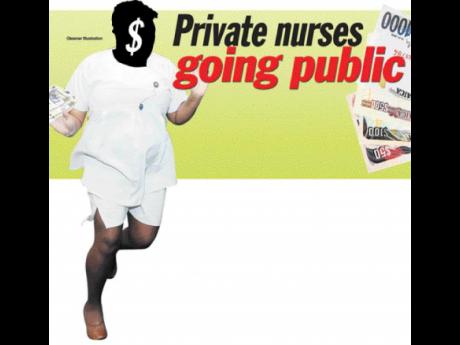Private nurses going public - Better salaries, allowances drive professionals to government-run facilities
Tyrone Thompson, Gleaner Writer
Improvements in salaries and allowances, spurred by a reclassification approved in 2012, are resulting in a major movement of nursing staff from private to public health-care facilities.
Harvey Levers, president of Nuttall Memorial Hospital in St Andrew, told The Sunday Gleaner that just recently the institution lost a senior registered nurse to the Kingston Public Hospital.
"It's difficult to compete," Levers said. "In terms of salaries alone, the public-run institutions are paying up to 20 per cent more in salaries plus benefits that we can't match."
He went on to state that since the reclassification exercise, the nursing staff at Nuttall have been making increased demands in relation to their salary packages.
"The fact is that at the moment there are not many vacancies in the public sector but the nurses are seeing what their counterparts are making in the public facilities and they are requesting upgrades to their salaries, which we are finding difficult to meet."
One registered nurse with whom The Sunday Gleaner spoke, on condition of anonymity, agreed that there were numerous incentives available in the public sector that were acting as a magnet for nurses from the private hospitals.
"Honestly, the overtime that you can work in the public hospital alone is a major pull," said the nurse, who felt if she revealed her name she might lose out on the lucrative overtime sessions.
"At the private hospital, all you may receive is the basic salary and you can't live off that, because there is not that much overtime there."
Incentives & allowances
She said the numerous incentives and allowances, including shift premium, overtime sessions and location allowance, have been the reasons more private-sector nurses are seeking employment in public facilities.
The registered nurse, who left the University Hospital of the West Indies to take up a position at the Kingston Public Hospital, said a registered nurse with no speciality makes between $70,000-$80,000 as base salary but, with overtime and incentives, take-home pay can be over $200,000."
Her calculations have been acknowledged by the management of Andrews Memorial Hospital.
"We have had dialogue with them (nursing staff) about it. They talk to me in the hallways and tell me 'Doc, you have to put something on that thing (salary) because it's difficult'," said Dr Patric Rutherford, president of Andrews.
Rutherford told The Sunday Gleaner that the movement of nurses to the public sector has been a significant challenge, noting that in the last year alone the hospital has lost more than 10 nurses.
"Historically, this is the first time
in 18 years that I have seen nurses leaving the private facility to
work in the public hospital; it has never been like this before," he
said.
The departure of the nurses has had a double
impact on Andrews' finances. This is due to the fact that many of these
nurses who have chosen to leave were experienced, speciality-trained
nurses who had received additional training at the expense of the
hospital.
"We have tried to train and bond some nurses
but, as soon as the bond is up, it's 'adios'. We
have even had some leave before the bond is up," lamented
Rutherford.
Revenue increase
needed
He said he felt the only way the hospital could
attempt to match incentives and allowances in the public sector would
be to increase revenue, through an increase in the costs of services,
which could affect the viability of the
hospital.
"We've been trying hard to keep costs down,
but when you have a jump, as was the case in the public sector, you have
to respond," explained Rutherford.
He said that
despite the financial challenge, the hospital has taken steps to
increase the overtime sessional rates paid to
nurses.
Health Minister Dr Fenton Ferguson, while
admitting there are many vacancies in the public sector for nurses, said
he was not specifically aware of the current
trend.
"That would be somewhat unusual, but I am not
aware of any drift, not by virture of any reports I have seen," he said.
"But having raised it, it is something I would have to look
at."
Ferguson was in agreement that allowances and
incentives paid to public-sector nurses could act as a major attraction
to their colleagues in the private sector.
"The truth
is, base salary, even with reclassification, would not have gone up to
that extent but the big thing is the allowances, the overtime, the
concessions is where nurses really do well, and this is something that
would not necessarily be trumpeted by the nurses
themselves."
He said the Ministry of Health was also
facing challenges budgeting for some of the allowances and incentives,
but acknowledged that actions to curb them might prove
difficult.
"It's a very sensitive matter, it's
something we've been working on, but it's very sensitive because
anything that would mitigate against a person's salary, especially at
these times, would be met with opposition."
Attempts
to contact the Nurses' Association Jamaica (NAJ) proved unsuccessful, as
The Sunday Gleaner was told NAJ President Antoinette
Patterson Bartley was "unavailable for
comment".

